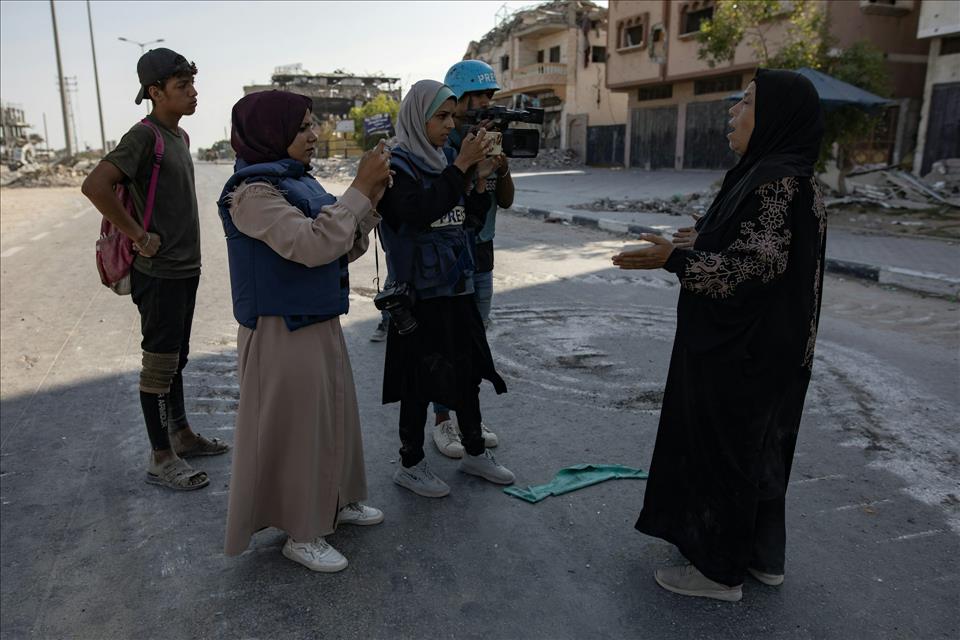
Israel Is Still Not Allowing International Media Back Into Gaza, Despite The Ceasefire
Foreign journalists have been banned by Israel from entering the Gaza Strip independently since the start of the war. And senior members of the international media are not optimistic that access to Gaza will change any time soon.
I asked Phil Chetwynd, global news director at Agence France-Presse (AFP), why he thought Israel was so insistent at keeping out external reporters. He told me:
Read more: How Israel continues to censor journalists covering the war in Gaza
He reflected on how AFP would like to plan its coverage.
He added:
Reporting on GazaFor the past two years, the only access Israel has provided for foreign media to enter Gaza has been under embedded conditions with the Israeli military. In the weeks following the October 7 Hamas attacks in 2023, a number of British reporters including from the BBC and Channel 4 News did avail of this restricted coverage. American correspondents and news agencies have also taken up offers.
But this access has been sporadic and has favoured Israeli journalists. In August 2025, an ABC Australia team managed to secure an“embed” trip to the Kerem Shalom aid site in southern Gaza after repeated requests were turned down.
In his report, ABC's Matthew Doran pointed out that embeds are“highly choreographed and controlled”. However, Doran explained that he accepted the trip as“an opportunity to gain access to a site Israel is using to prosecute its case it is trying to feed the population of Gaza – an argument the humanitarian community, and world leaders, argue is full of holes”.
Doran noted that the small embed trip included an Israeli media outlet, an Israeli writer and“a handful of social media influencers”, all eager to post pro-Israeli sentiments. Israel has consistently accused the international media of succumbing to Hamas propaganda.

Some international journalists have entered the Gaza Strip under embedded conditions with the Israeli military. Ohad Zwigenberg / EPA
A number of initiatives have been tried over the past 24 months to enable external reporters access to Gaza. The Foreign Press Association (FPA) in Jerusalem has challenged the restrictions in Israel's supreme court.
On September 11, the FPA noted that it had been a full year since it submitted its second petition to the court. But despite the urgency, it said“the court has repeatedly agreed to the [Israeli] government's request for delays and postponed one hearing after another”.
Read more: Gaza: high numbers of journalists are being killed but it's hard to prove they're being targeted
Petitions have also been sent to the Israeli authorities with the backing of international media organisations and groups such as Reporters Without Borders and the Committee to Protect Journalists (CPJ). Both of these have coupled their campaigns with calls for an immediate end to the killing of Palestinian journalists in Gaza who have been the world's only eyes on the conflict as witnessed by those under fire.
According to the CPJ's Jodie Ginsberg , writing in the Guardian in August, more than 192 journalists and media workers have been killed in Gaza since the start of the war. This number includes 26 journalists whom the CPJ believes have been targeted deliberately in“the deadliest conflict for journalists that we have ever documented”.
Israel has denied targeting journalists, except in cases where it has accused particular Palestinian journalists of being terrorists. The CPJ has argued in return that Israel should stop“its longstanding practice of labelling journalists as terrorists or engaging in militant activity, without providing sufficient and reliable evidence to support these claims”.
The BBC calls for access to Gaza.
As recently as September, the BBC along with AFP, Associated Press and Reuters launched a film calling on the Israeli authorities to allow the international press access to Gaza. It noted the media's part in informing the world about the D-Day landings, the Vietnam war, the Ethiopian famine, the Tiananmen Square massacre, the Rwandan genocide, the Syrian refugee crisis and the current conflict in Ukraine.
David Dimbleby's narration calls on Israel to allow international reporters in,“to share the burden with Palestinian reporters there so we can all bring the facts to the world”.
But looking at the current stalemate, a cynic might ponder if the the first open access to Gaza will be to the Washington press caravanserai that will surely be allowed in to document the rebuilding of Gaza into a Trump-envisioned riviera.

Legal Disclaimer:
MENAFN provides the
information “as is” without warranty of any kind. We do not accept
any responsibility or liability for the accuracy, content, images,
videos, licenses, completeness, legality, or reliability of the information
contained in this article. If you have any complaints or copyright
issues related to this article, kindly contact the provider above.

















Comments
No comment